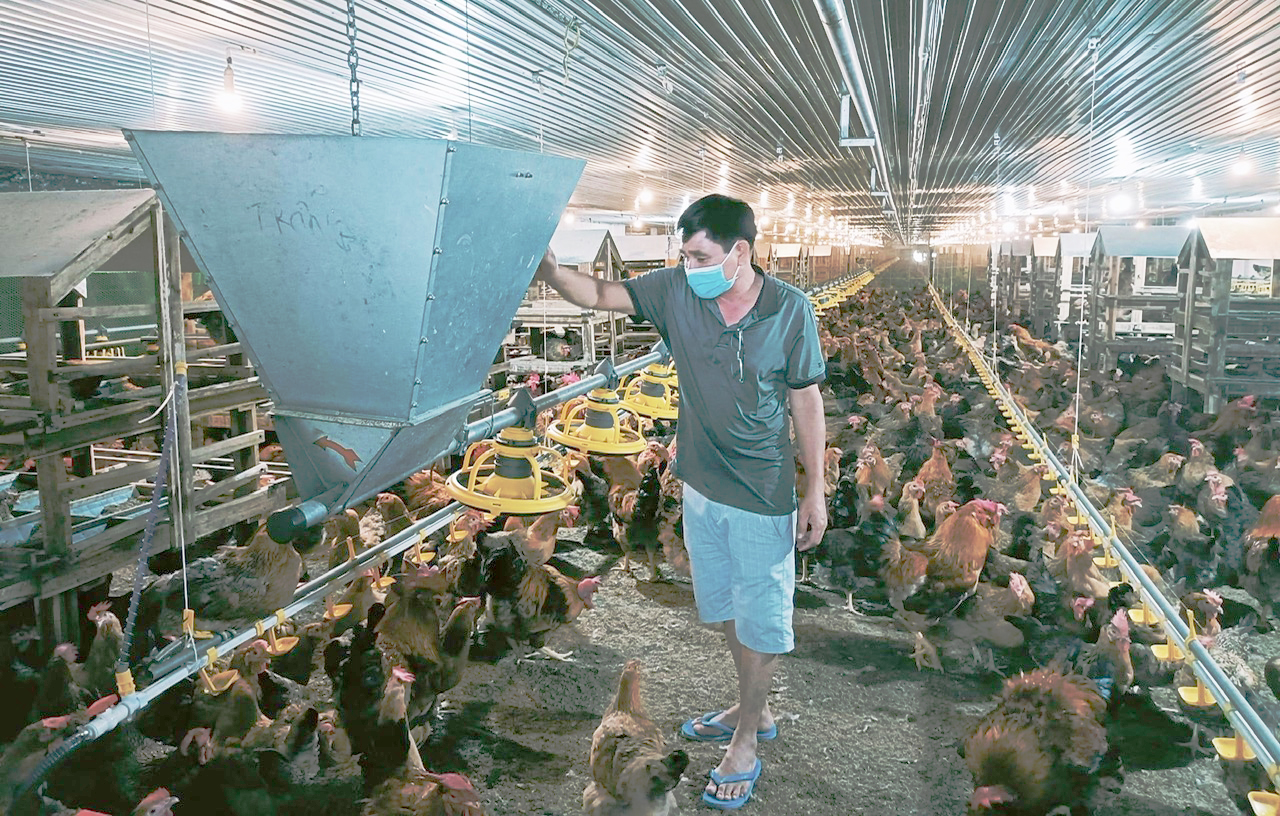Sustainable economic development includes application of technologies, sectional planning, and environment assurance
Before the increasingly developing trend of model farming in Binh Duong, the application of high technology and clear zoning planning will help investors feel secure as well as ensure disease safety and environmental hygiene. At the same time, handling farms that cause environmental pollution also needs to be resolute and timely to create a deterrent force.
Off residential area husbandry
Mr. Hoang Quoc Viet, Chairman of the People's Committee of Tan Hiep commune (Phu Giao district), said that to develop sustainable livestock farming, the locality has established a livestock farming planning area in hamlet 6 of the commune. In response to this policy, some households have built many livestock farms and strictly complied with regulations, including ensuring environmental hygiene.

A cold chicken farm applies high technology of Mr. Dinh Ngoc Khuong's family in An Binh commune, Phu Giao district, achieves high efficiency in animal husbandry without affecting the environment.
In conversation with us, Mr. Van Quang Chinh, Vice Chairman of Phu Giao district People's Committee, said that according to statistics, there are over 200 livestock farms and facilities divided into 3 levels for environmental inspection and treatment in Phu Giao district.
According to the district People's Committee leaders, for 10 communes of the locality, they have selected land far from residential areas to establish concentrated livestock farming areas. From the beginning of the year until now, the functional forces of Phu Giao district have inspected and discovered, drawn up records to handle 10 cases of violations in the environmental field.
Outside Phu Giao, one of the localities currently developing rapidly in the model of farming is Dau Tieng district. Mr. Nguyen Thanh Tung, Vice Chairman of the People's Committee of Dau Tieng district, said that there are currently about 100 farms of all sizes in the area.
To ensure the living environment of the people, the local government has requested some households to relocate their livestock farms to suitable locations. In parallel, Dau Tieng district has selected Minh Thanh commune as the planned area for concentrated livestock farming. In the local livestock farming area, investors have built a wastewater treatment system that meets standards.
“In the coming time, Dau Tieng district will continue to expand its planning, zoning livestock farms in remote areas from residential areas in some remaining communes. The formation of livestock farming areas must be convenient in terms of transportation infrastructure for people to easily transport goods. This will contribute to promoting the economic development of livestock farming, creating jobs for people in rural areas,” Mr. Nguyen Thanh Tung added.
Sustainable development
Mr. Tran Phu Cuong, Head of the Livestock, Veterinary and Aquaculture Sub-Department of the province, said that in recent years, the province's livestock sector has seen many positive changes. This has contributed to the growth of the agricultural sector and rural development of the province. With the diversification of livestock economic models, it has created employment and increased income for the people. However, urbanization, concentrated residential areas require farm owners to ensure environmental protection during their operations.
According to Mr. Tran Phu Cuong, currently the agricultural model applying closed farms, cold farms in pig and chicken farming has brought high economic efficiency, especially in Bau Bang, Phu Giao, Dau Tieng, and Bac Tan Uyen districts. "The province's livestock direction in the near future is large-scale farming, applying high technology, ensuring disease safety and environmental hygiene. Livestock development in this province in this direction is sustainable; the living environment around the livestock area will be better ensured," Mr. Tran Phu Cuong emphasized.
The development of livestock farms promises to contribute significantly to the economic development of the locality. However, the current issue is how to not affect the surrounding environment. In exchange with us, Mr. Tran Thanh Quang, Head of the Environmental Protection Sub-Department (environmental protection) of the Department of Natural Resources and Environment, stated that according to regulations, livestock farms are divided into two types. For large-scale industrial livestock farms under provincial management, investors must prepare a dossier for provincial approval and operating permits. In which, the environmental protection permit dossier must ensure compliance with regulations.
For family-run livestock farms under district management, monitoring, inspection, and handling are carried out. "In order to ensure the sustainable economic development of livestock farms, districts have now also re-planned safe livestock breeding areas. This initiative provides additional conditions for livestock farmers to develop their economy while protecting the environment," added Mr. Tran Thanh Quang.
Reported by Thanh Quang – Translated by Vi Bao

